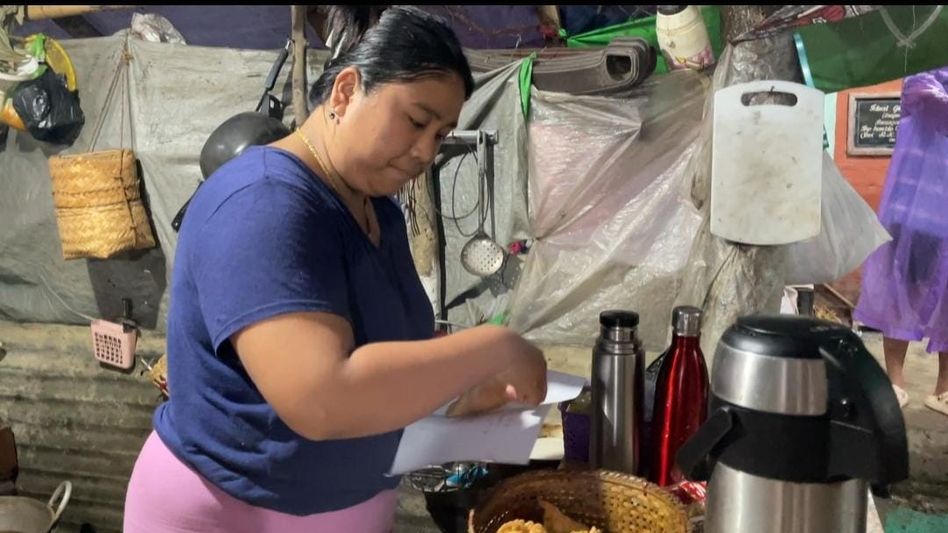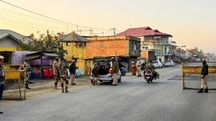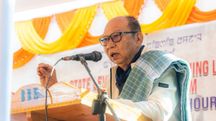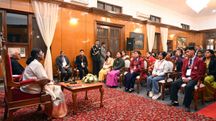
Manipur violence: Refugee mother Nganthoibi's struggle for normalcy
Nganthoibi, displaced by communal violence in Manipur, recounts her harrowing journey from Churachandpur to a relief camp in Imphal. Despite challenges, she strives to rebuild her life for her daughter.
 Manipur violence: Refugee mother Nganthoibi's struggle for normalcy
Manipur violence: Refugee mother Nganthoibi's struggle for normalcyNganthoibi cradles her daughter Yaihenbi in a cramped room that once served as a college staff room. The child's name means "more than a jewel". While her child is precious beyond measure, their current home is far from it.
"I'm originally from Imphal," Nganthoibi explains, her English a remnant of her past life. "I moved to Churachandpur after my marriage in February 2022. A year later, I became a refugee in my own homeland."
May 2023 remains etched in Nganthoibi's memory. "We were living happily in Churachandpur, but that day, communal violence erupted across the state," she recounts. The unrest shattered countless lives, including Nganthoibi's family of six.
"Our house was burnt down, our possessions looted, everything vandalised," she says, her voice heavy with loss. "On May 11, we moved to this relief camp in Imphal. We fled with nothing but the clothes on our backs, not even sandals. We arrived barefoot."
The relief camp, a repurposed educational institution, now houses about 800 displaced individuals. Nganthoibi's family shares a single room with a dozen others. A common kitchen in the backyard serves as a gathering spot, but it is a poor substitute for the homes they once knew.
During rainy seasons, the camp floods, making life even harder. The dark, cramped, and overcrowded conditions remind everyone that this is not a home, but a temporary shelter that has stretched into an indefinite stay.
Despite these challenges, Nganthoibi and her husband have found a way to support their family. "In July 2023, we started this small tea stand in the camp," she explains. "It was primarily to earn money for our baby's milk and care."
Their modest business selling tea and samosas has grown over the past year. "Now we can occasionally afford better food and essential clothing," Nganthoibi says with a hint of pride.
But the struggle persists. The camp provides two meals a day, with breakfast - usually biscuits or instant noodles - reserved only for children. The lack of proper nutrition and essential supplies weighs heavily on the residents.
As Yaihenbi grows, now a toddler of 18 months, Nganthoibi's concerns for her daughter's future intensify. "I don't want my daughter to grow up here," she says, worry evident in her voice. "What memories will she have? This camp, this unhomely environment?"
Nganthoibi's pain is clear as she adds, "It saddens me that my daughter considers this camp her home. She feels uncomfortable when we go out; she prefers it here. But that's not what I want for her. I want a proper home environment. I want us to return to our real home."

Her frustration with the slow pace of government action is evident. "It's been nearly a year and a half," Nganthoibi points out. "The government hasn't taken any substantial steps to help us. They announced plans for temporary houses, but we are still in relief camps. Their response has been frustratingly slow."
This sentiment recently echoed in the halls of Parliament. Manipur's newly elected MP Bimol Akoijam spoke about the crisis: "It is one of the most militarised areas in the country where armed police outnumber civil police, besides the armed forces of the union. Despite this, how were more than 60,000 people rendered homeless and thousands of houses destroyed?"
The government, for its part, insists progress is being made. Prime Minister Narendra Modi recently stated, "To normalise the situation in Manipur, the government is continuously making efforts. More than 11,000 FIRs have been registered. Manipur is a small state. Over 500 people have been arrested. We have to accept that incidents of violence are continuously reducing in Manipur. This means hopes of peace are possible now."
Yet for many, like Nganthoibi, these assurances feel distant from reality. Opposition leader Rahul Gandhi, during his visit to Manipur on July 8, said, "Manipur continues to suffer greatly, and the people of the state are yearning to be heard." He called for the Prime Minister to witness the situation firsthand, a sentiment shared by many camp residents who long for their plight to be truly seen and understood.
As the political debate continues, the daily struggles in the camps persist. The laughter of children playing in narrow alleys mingles with worried conversations of adults. For Yaihenbi and countless other children, this camp is the only home they have known.
ALSO WATCH:
Nganthoibi's plea is clear and heartfelt: "We want to return to our normal lives. We're exhausted living like this. I appeal to both state and central governments to help restore our normalcy."
As another day ends in the camp, Nganthoibi's tea stand remains open, a sign of the strength of those displaced and their ability to keep going despite huge challenges. However, it calls for both the government and society to address the root causes of the conflict and find sustainable solutions for the displaced. Until then, families like Nganthoibi's will continue to serve tea, sell samosas, and hold onto the hope of one day returning home - wherever that may be.
Copyright©2025 Living Media India Limited. For reprint rights: Syndications Today









